- Home
- Patricia Briggs
Shifting Shadows: Stories from the World of Mercy Thompson Page 39
Shifting Shadows: Stories from the World of Mercy Thompson Read online
Page 39
And right now he needed to pull his reformed head out of his arse because he’d just left a little helpless lamb out for a man who thought himself the big bad wolf. If she’d been Mercy, he wouldn’t be worried; Duffy would be lucky if he could walk tomorrow. But if she’d been Mercy, Duffy would never have chosen her as a target.
• • •
Mel kept her back against the door as if that might help. “No,” she said. “I won’t.” But she knew that she would, and so did Duffy; it was in the confidence of his voice and body. For Chris, she would do anything.
The doorknob turned, and the door, rather gently, pushed her to the side and Ben the Grouch—that’s what the office workers called him—came in. She stared at him in shock.
“Blackmail, Duffy?” said Ben, toeing off his snow-covered shoes and stowing them next to hers—as if he’d done it a hundred times. “That’s pretty low, even for you.” There was something funny with his voice. It was deeper and less crisp than usual, almost slurry, and she wondered if he’d had too much to drink. His body language was a little off, too. He kept his gaze slightly averted, never looking directly at Duffy or her.
Duffy set the wine down on the table abruptly, losing the smile. There was a flash of rage before it was replaced by sternness—did he practice his expressions in front of a mirror?
“I’m sorry that it had to go down this way, Mel,” he said so sincerely she almost could have believed that they’d been having a business discussion instead of a proposition.
Duffy turned to Ben, his face serious, “I don’t know how much you overheard, but it’s not what you think. Someone has been leaking information, and I just narrowed it down to Melinda. I was trying to see how far it had gotten by letting her believe I would cover for her, but you put the kibosh on that.”
She’d never seen anyone lie so smoothly. People would believe him, he was influential and he had money.
“Are you really selling secrets, Mel?” Ben sounded amused, in the mocking sort of way he had. “Shame, shame. So where is all the money going?” He glanced around, making a big production of the tiny living room and kitchen that comprised half of her apartment. He stretched his neck from one side to the other as if it were stiff, and when he was done, he focused on Duffy.
“Your eyes—” Duffy momentarily lost his usual confidence and looked shaken.
“What big teeth you have, dear,” said Ben. At least that’s what she thought he said, though it didn’t make any sense.
Duffy took a gulp of his wine, regrouped quickly from whatever had bothered him. He said, “All the more reason that getting on my bad side would be a terrible idea if you want to keep your job, Shaw. Walk away, and I’ll forget what I’ve seen.”
Ben laughed, and the sound made her take a step away from him. It was not a good laugh.
“You’re making a mistake.” Duffy stood up. He was a big man, taller and heavier built than Ben. He worked out—he’d told her that along with tales of his black belt when he had been trying to impress her.
“No,” said Ben. “I’ve made lots of mistakes. I know what that feels like. This is not a mistake. And as for what I am, whoop-de-f . . . freaking-do. It’s not a crime.”
“She’s a traitor,” Duffy said. “And I can make your job very uncomfortable.”
Ben snorted. “She’s a secretary, she doesn’t have access to anything. My doddering old mum in Merry Old England knows more about hacking than she does.”
He smiled, and Mel found herself stepping away from that smile until her legs hit the bookcase under the TV. The smile hadn’t been aimed at her, though. Duffy stumbled as he backed up against the counter in the kitchen—which was as far as he could go.
Ben followed him, crowding him by just standing in the kitchen. There was no amusement in his voice when he growled, “And if you’ve manufactured something that you think will implicate her, let me tell you that you aren’t hacker enough to cover your tracks from me.”
Then he stepped to the side and pointed to the front door. “Leave. Right now.”
Duffy didn’t even so much as glance at Mel as he bolted out the door.
She closed the door and glanced over at Ben. He was bent over, hands on his thighs as if he had just run a race.
“Ben?” she said. “Thank you.” She hugged herself. “But this was a mistake. We’re both going to be out of work.” She had no family, and only her friends at work. With Duffy spinning stories, she’d have to stay away from them. “Maybe in jail.”
“I watched a man brutalize women once,” he told her without looking up. “I was under orders, but finally put a stop to it anyway. Never again.”
She blinked at him. “Under orders? In the military?”
He laughed, coughed, and said, “In a manner of speaking. Pack business.”
“Pack?” The word should mean something to her, she knew, but she was still worried about what she was going to do without a job.
He lifted his head, and she saw what Duffy had. His eyes weren’t human.
“You’re a werewolf,” she whispered. She’d never seen a werewolf in person before, though she knew there were some in the Tri-Cities. She had seen a wolf at the zoo, though, and it had had the same hungry golden eyes.
“Yes,” he said. “And I didn’t even need to appear on four paws before you got it.”
“Sarcasm is the lowest form of wit,” she said, hurt, though she thought that she ought to be more afraid. A werewolf. That explained some things about Ben.
He bent his head down again and huffed as if he was having trouble catching his breath. Or maybe he was laughing. “You know it’s bad when they start quoting Oscar.”
“Oscar?”
He glanced at her. “Oscar Wilde.” His face contorted, released, and then contorted again as his light English complexion darkened. “F-f-f-f . . . freaking fire truck that hurts.” He bent back down and made a noise that made her cringe.
She wanted to help, but she didn’t know how. She was out of work, possibly about to be arrested, and Ben was changing into a scary beast right in front of her. And that was something else he’d given up to try to help her. If he’d wanted people to know what he was, he’d have told them before this.
“I won’t tell anyone,” she said. “About your being a werewolf. At work, I mean. Not that I have a job anymore.”
“Ssst.” He interrupted her nervous babble. “Won’t matter whom you tell; Duffy will announce it to the world. Now shut up a moment and let me get this out because I don’t have much time. If you are fired, I can find you work while you sue for sexual harassment. I and the rest of the DBAs will be happy to testify. Duffy has squat on you.” He looked up again, and she wished he hadn’t. His face was . . . wrong. “Unless you have been selling secrets?”
“No,” she said.
“Thought not. Whatever he has is made up—and he’s not good enough with computers to make a convincing case. He can barely open his own flipping e-mail.” He bent down again, his fingers whitened as he took a stronger grip on his calves. “Full moon tomorrow, luv. And apparently I’m not man enough to stave off the change. I’m about to go werewolf on you so listen up. I have help coming, should be here in about a half hour. You go into your bedroom and shut the door like a good girl, and don’t come out for about fifteen minutes.”
He breathed hard and with obvious effort, but he didn’t stop talking until his whole body tightened up and shook. When it stopped, he took a deep breath. “Right. I won’t hurt you, but watching someone change is pretty gross for you and painful for me and we’ll both be happier if you tuck yourself away until I’m done.”
“Okay,” she whispered, but her feet were frozen to the floor, and she knew exactly how a deer felt, stuck out there in the middle of the road with a truck bearing down on it but too shocked by the bright lights to run.
He looked up and snorte
d. His face was distorted by sharp teeth that looked too big for his mouth. She covered her own mouth with her hands.
“Now,” he growled.
She did better than just shut the door. She crawled onto her bed and pulled the blankets up around her ears so she didn’t have to hear the noises he was making. The TV made it sound so romantic to be a werewolf. It didn’t sound romantic. It sounded scary, and it sounded like it hurt.
• • •
Ben stretched and glanced at the shreds of his pants. He’d managed to shed most of his clothes after Mel had rabbited into her bedroom, but the pants had stayed on and suffered the beast’s wrath. He shook himself and looked around for a place to wait for Mercy, who’d promised to hurry to Mel’s house as soon as he’d called, but she was all the way out in Finley, and it would take her a while to get here.
He took a step and his hip hit one of the kitchen chairs. He stepped back and bumped into the cabinets. The house was small, tiny even. There wasn’t any place he could see in Mel’s house big enough for him to sit down except the love seat—and even it would be iffy.
He hopped up, careful not to dig his claws into the faded, floral-print fabric. The arm made a nice chin rest.
Mel’s house was like her: small, not too bright, but warm and uncluttered. Safe. His secretary. His.
He snorted and wondered what the other DBAs would say if they realized that he thought of them as his people. He wiggled a little to get more comfortable while he waited for Mercy to pick him up.
• • •
Mel sat among the DBAs who had tried their best to get front row. They hadn’t succeeded because the security team had made it to the auditorium ahead of everyone else.
Lorna Winkler took the stage first, and all the men around Mel straightened in their chairs and brushed dandruff off their shoulders. Mel exchanged a rueful look with Amanda, one of the few women in the DBA division. Lorna might not be brilliant or even know much about computers, but she was able to get the IT department all aimed in the same direction when she needed to if only because all the men in IT would do anything she asked of them as long as she did it in her beautifully modulated voice. And the men outnumbered women in the IT department by better than three to one.
As Lorna spoke of how impressed she’d been with their performance last quarter, Mel imagined her practicing it in front of the mirror. There were bets about how often “world peace” would come up in the speech; the most in a previous speech had been six, though Mel hadn’t been there for that one. Rumor was that once she hadn’t said those two words together, but no one believed it. Mel was glad her mother had never sent her out to be scarred from too many beauty pageants at too young an age.
“I believe that we must, all of us, strive every day to become better people,” Lorna said, smiling so that everyone could see her perfectly capped white teeth. “Small steps lead to great ones, like world peace and liberty for all. In that vein, I have to tell you that it pleases me to encourage you by presenting one of your own who has overcome a very bad habit. He has agreed to speak to us today about how he accomplished that and how you might improve yourselves. I give you Ben Shaw”—she smiled—“IT’s favorite werewolf.”
A polite applause arose and stopped.
Ben got up and put an empty decanter of whiskey on the side of the podium.
“My speech,” he said, reading awkwardly from a sheet of paper in front of him, “is about how I broke my fucking habit of drinking shitty whiskey.”
By the time he’d finished, the audience was in stitches. He’d kept a serious demeanor the whole time, along with that awkward, serious voice that managed to counter the impression of intelligence Ben’s British accent encouraged. The contrast between his tone and the words he was using made Mel want to clear the wax out of her ears because the combination was just so wrong. And funny.
Ken Lincoln, sitting next to Mel, said, in awe, “I don’t think I’ve heard that many swearwords in such a short period in my life, and I was in the army. And the best part is that I don’t have to quit smoking.”
“What exactly is a pony-shagging, bitch-faced, ball buster?” asked Amanda, sounding strangled as she wiped her eyes.
Mel was watching Lorna Winkler’s face as one of the upper management, a grin on his face, shook her hand. She was pretty good at lip-reading, but he was faced half-away. She caught “comedy routine” and “not boring” and, as Lorna smiled graciously, “good idea.”
Ben smiled slyly at Mel, then joined Lorna and shook hands with Lorna’s bosses.
HOLLOW
There can’t be a collection of Mercyverse stories without a Mercy story, right?
I have always had vivid dreams. Those dreams are especially real when I am sick—sometimes it takes me a while to figure out which part was the dream and which the reality. This story is born from a nightmare about an old friend who was being haunted by his murdered wife. It is also about Mercy making peace with the changes in her life—which have been sea changes over the past few books. There are a few spoilers for Night Broken in this story.
The events in “Hollow” take place after the events in Night Broken.
The beginning: thirteen years ago, All Hallow’s Eve
Rick folded his father’s suit and set it in a box that was going to charity. The whole room was packed into boxes. A double row of donation items, boxes for auction, and two boxes of items he’d decided to keep.
The only thing left was his father’s bag of personal effects, then he could put his father’s presence behind him. A year ago, he’d have mourned, if for nothing but the lost opportunity for a change for the better. But he was a different man now at twenty-two than the boy he’d been at twenty-one. Losing both of his parents within months of each other would change anyone. Especially since his mother had committed suicide, and six months later, his father drove off a cliff. His death had been ruled an accident, but Rick was undecided: his father had been a very good driver.
But it wasn’t just his parents’ deaths that had changed him. Finding his wife’s dead body and then being charged with her murder had started the ball rolling. After he’d survived the trial with his freedom and sanity intact, or mostly intact, he’d become a man who could go through his father’s things without feeling either rage or sorrow.
He picked up the white plastic bag that held the contents of his father’s pockets and whatever happened to be on his body when he’d arrived at the hospital and spilled the contents out on the desk. His father’s wedding ring—why he wore one when he never had honored the vows it was supposed to represent, Rick had never been able to fathom. His wallet. A handful of change.
Rick opened the wallet. Someone at the hospital or the morgue had emptied the cash: his father would never have been driving around without cash. The credit cards seemed to be all there, though. He set those aside along with his father’s driver’s license to be shredded. There were two photos, battered and worn, in the wallet: Rick at six or seven with a softball bat over one shoulder and a determined look on his face, and Rick’s mother—one of the photos taken at their wedding.
Rick looked like he was on his way to being an athlete, and his beautiful mother looked sweet and happy. Rick wondered why his father would keep those photos, the ones that lied so badly about the people in them. Rick had never, that he could remember, hit a softball and made it go anywhere but in the foul zone. And his mother . . . well, sweet and happy were not adjectives he’d have applied to her.
Maybe his father had liked to pretend that his life was different than it really was. Rick understood that impulse even if he’d always been more of the face-the-bad-stuff-head-on kind of guy. So Rick put both photos in the to-be-shredded pile and tossed the wallet in the charity box.
There was something more in the bag and Rick dumped it out: a thick silver chain with a blocky, carved-jade pendant that looked both arty and masculine. It w
as a nice piece, but he didn’t wear jewelry—and he didn’t want a reminder of his father wrapped around his neck.
He picked it up and held it up to the light so he could judge if this was something that should go to auction or if he should give it to charity.
As he held it, he thought absently that it might have been an expensive piece. A deft hand had created the angles and the deliberately primitive lines of the pendant. Toward the center there was a change in color from clear, translucent green to frost. The carving dipped just there, as if the someone had started to carve out the cloudy bit but had reconsidered. He checked for a maker’s mark—something he could use to determine value.
He liked the way it felt in his hand, liked the contrast between cold chain and warm pendant. For the first time since he’d begun cleaning out the room this morning, Rick felt something. He clenched the pendant in his fist and let himself feel the love he had for his family—twisted and broken as they had been, he’d still loved them. The necklace felt like family.
He snorted at his own fancy. “Don’t anthropomorphize,” he advised himself. “It’s a piece of jewelry.”
But he put the chain around his neck anyway and didn’t feel as alone with the pendant warm in the hollow of his throat.
Mercy
Present day
I walked up to the remains of my garage with the paperwork the insurance adjustor had given me and the paperwork Adam’s choice of contractor had given me. Spring was old and summer just around the corner, and the garage where I’d spent the better part of the last thirteen years looked beyond resurrection.
Adam’s friend the contractor was of the impression it would be much more economical to bulldoze the remains of the structure and start over because the fixes that the insurance adjustor had approved payment for weren’t adequate, in the contractor’s opinion.

 Wolfsbane
Wolfsbane When Demons Walk
When Demons Walk Cry Wolf
Cry Wolf On the Prowl
On the Prowl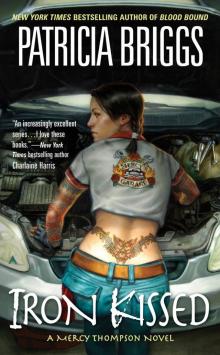 Iron Kissed
Iron Kissed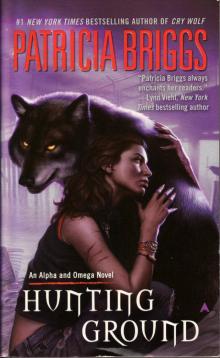 Hunting Ground
Hunting Ground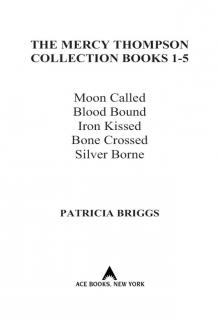 Patricia Briggs Mercy Thompson: Hopcross Jilly
Patricia Briggs Mercy Thompson: Hopcross Jilly Burn Bright
Burn Bright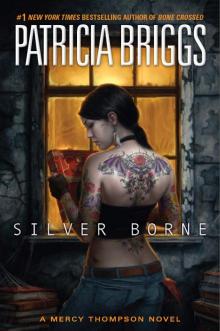 Silver Borne
Silver Borne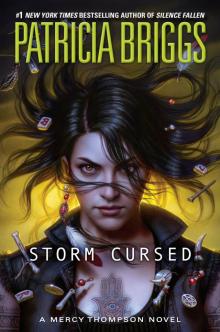 Storm Cursed
Storm Cursed Shifting Shadows
Shifting Shadows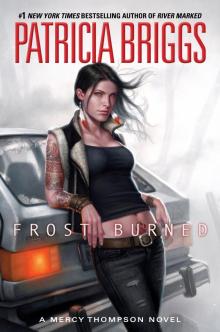 Frost Burned
Frost Burned River Marked
River Marked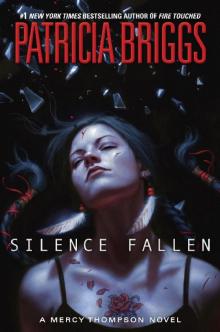 Silence Fallen
Silence Fallen Fair Game
Fair Game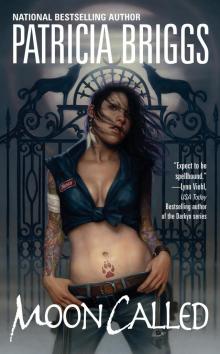 Moon Called
Moon Called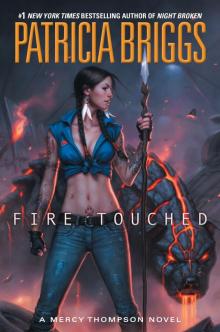 Fire Touched
Fire Touched Dead Heat
Dead Heat Blood Bound
Blood Bound Dragon Bones
Dragon Bones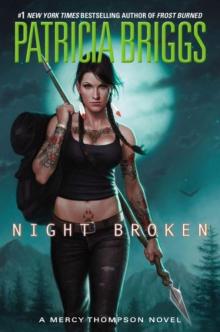 Night Broken
Night Broken The Hobs Bargain
The Hobs Bargain Ravens Shadow
Ravens Shadow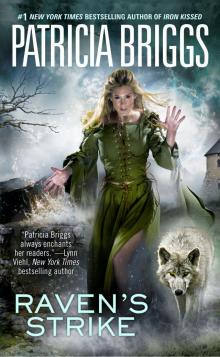 Ravens Strike
Ravens Strike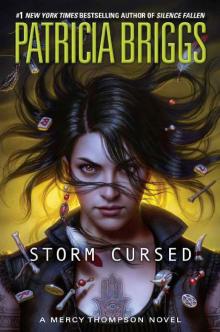 Storm Cursed (A Mercy Thompson Novel)
Storm Cursed (A Mercy Thompson Novel)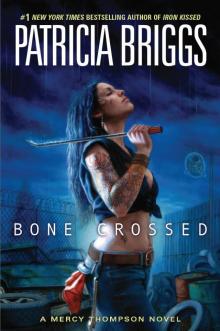 Bone Crossed
Bone Crossed Dragon Blood
Dragon Blood Smoke Bitten: Mercy Thompson: Book 12
Smoke Bitten: Mercy Thompson: Book 12 Smoke Bitten
Smoke Bitten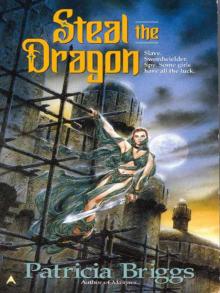 Steal the Dragon
Steal the Dragon 0.5 On The Prowl (alpha and omega)
0.5 On The Prowl (alpha and omega) Alpha and Omega
Alpha and Omega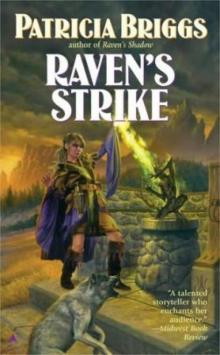 Raven's Strike rd-2
Raven's Strike rd-2![[Mercy 03] - Iron Kissed Read online](http://i1.bookreadfree.com/i/03/24/mercy_03_-_iron_kissed_preview.jpg) [Mercy 03] - Iron Kissed
[Mercy 03] - Iron Kissed Raven's Shadow rd-1
Raven's Shadow rd-1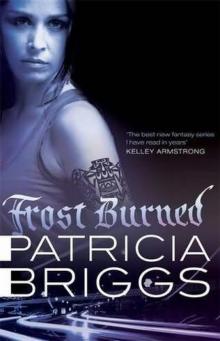 Frost Burned mt-7
Frost Burned mt-7 Dragon Bones h-1
Dragon Bones h-1 Shifting Shadows: Stories from the World of Mercy Thompson
Shifting Shadows: Stories from the World of Mercy Thompson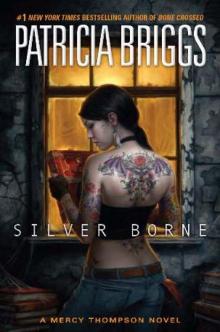 Silver Borne mt-5
Silver Borne mt-5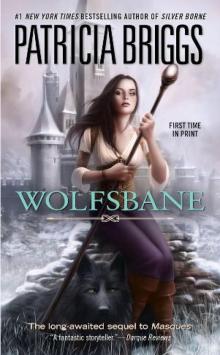 Wolfsbane s-2
Wolfsbane s-2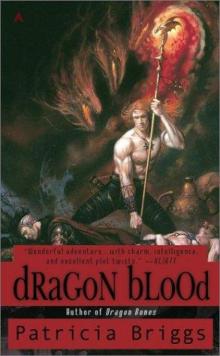 Dragon Blood h-2
Dragon Blood h-2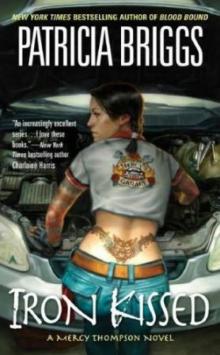 Iron Kissed mt-3
Iron Kissed mt-3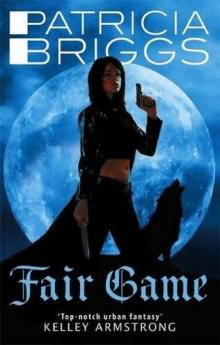 Fair Game aao-3
Fair Game aao-3 Masques s-1
Masques s-1![[Hurog 01] - Dragon Bones Read online](http://i1.bookreadfree.com/i1/04/03/hurog_01_-_dragon_bones_preview.jpg) [Hurog 01] - Dragon Bones
[Hurog 01] - Dragon Bones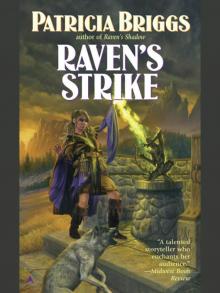 Raven s Strike
Raven s Strike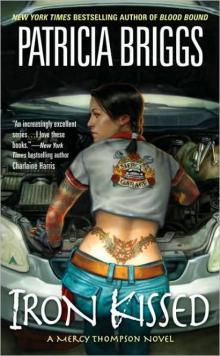 Mercedes Thompson 03: Iron Kissed
Mercedes Thompson 03: Iron Kissed Bone Crossed mt-4
Bone Crossed mt-4 Blood Bound mt-2
Blood Bound mt-2![[Mercy 01] - Moon Called Read online](http://i1.bookreadfree.com/i2/04/09/mercy_01_-_moon_called_preview.jpg) [Mercy 01] - Moon Called
[Mercy 01] - Moon Called River Marked mt-6
River Marked mt-6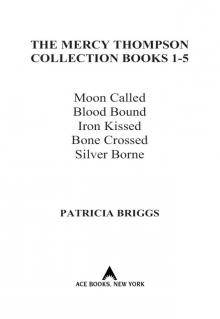 The Mercy Thompson Collection
The Mercy Thompson Collection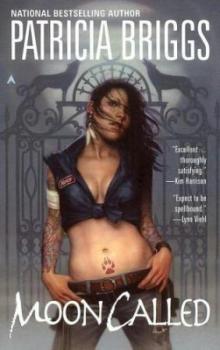 Moon Called mt-1
Moon Called mt-1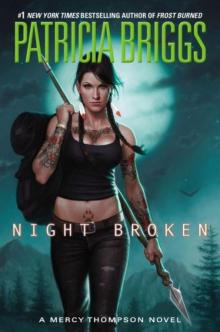 Mercy Thompson 8: Night Broken
Mercy Thompson 8: Night Broken